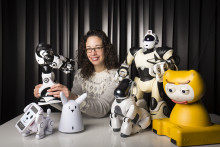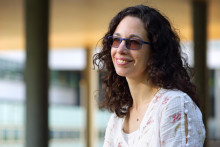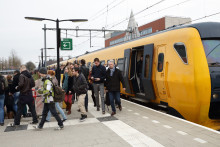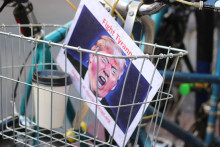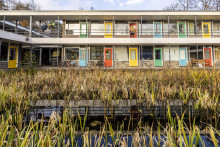First of all: how is life in Singapore?
Evers: ‘There is so much to tell! But on the other hand, it’s hard for me to describe what is going on because I’m still trying to figure that out. So if you are asking me ‘what is going on’, that is the same question I ask myself every day. I’m learning so much. When you arrive to Singapore, you have this false assumption that it will be just like Europe. Because it’s so modern and high-tech, you just assume it will work the same as in Western countries. It so doesn’t! But this is why I came here: to learn. To learn about the culture and the differences in working.’
vanessa evers in singapore
Since August 2019, Vanessa Evers serves as the founding director of the Institute of Science and Technology for Humanity at the Nanyang Technological University in Singapore. The institute was established in 2019 and its main objective is ‘interdisciplinary research on science and technology studies to shape a better future in the era of the 4th Industrial Revolution’.
What was the biggest shock you had?
‘The heat! It is so hot and humid. Also, the campus at the university is very big. And very hilly. As a Dutch person, you think you will just walk or cycle everywhere, but that is not really possible. You basically have to cycle up a mountain and by the time you get to your meeting you are drenched in sweat and completely unrepresentable. But it’s so pretty. There are parrots, little monkeys, tropical plants… and you should see the student halls. Each residence hall has a sort of food court with so much food. I could go to a different place every day and still not taste it all. I’ve figured out that eating is the favorite hobby of every Singaporean.’
What about your work? How different is the role of a director from being a professor?
‘The budget is much larger, so that is new for me. It is quite different of course. My overall goal is to support interdisciplinary research, the crossovers between social science and engineering, between humanities and technology. I want to support these interdisciplinary projects with real societal impact. For example, we have started a project on urban agriculture. It explores how communities in cities can live sustainably, grow their own produce, and what digital tools we could use to support them in this.’
Do you have time for your own research?
‘Not yet. The position is meant to be fifty percent leading, fifty percent research. I didn’t get to research yet, but I’m hoping that we can kick-off some nice projects as soon as researchers and students from the UT arrive.’
What will the UT researchers and students do at the NISTH?
‘At the UT, we are part of a so called Avatar challenge. We are aiming to figure out how could people, who are nowhere near each other, be together and work together through robotics. We could use robots and haptic technology to communicate. So if I would move my hand, the robot on the other side of the word would move its hand – and it would be the same as if I was in that room. From NTU I still want to contribute to this project and from my lab here I can be a nice remote location for testing. It would be nice to connect from here to the University of Twente and work together at a distance. We plan to have people from the UT visiting in March or April to see what can be done. Ideally, we’d like to set up a joint lab, a lab that is connected through this robotic technology, so that we can work together at distance and experiment with avatars.’
Originally, you said you were planning to stay in Singapore for at least one year. Are you still planning to come back to the UT?
‘We will stay here for longer than a year for sure, but I’m definitely still planning to come back. You should never say never, but I feel very attached to Twente.’
What do you hope you will have accomplished by the time you leave Singapore?
‘I really hope to establish interdisciplinary projects that join unusual combinations of disciplines. I hope to start research that has never been done before. Mostly, I enjoy being here and learning about everything. It is a great experience.’


